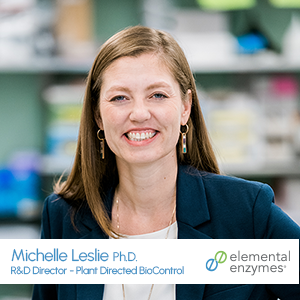
Orchards to Almonds, Sustainably Amplified Science for the Win

Don’t stumble on field stubble
Unknown to most people outside the biological sciences, peptides are essential for life. Peptides aid immune systems in warding off harmful pathogens, slowing aging processes, and providing energy for cells, among other functions.
The most widely known peptide, insulin, regulates glucose levels in the human body. Insulin was first used in the medical field 101 years ago and is still the leading treatment for Type 1 diabetes.
The most widely known peptide, insulin, regulates glucose levels in the human body. Insulin was first used in the medical field 101 years ago and is still the leading treatment for Type 1 diabetes.
“Within the plant world, peptides are key regulators of growth and immune system function,” explained Michelle Leslie, Ph.D., R&D Director of Plant Directed BioControl. Her team develops peptides for agricultural applications. “Peptides can act as hormones, communicating among plant cells to guide growth and development, as an alert system for an intrusive pathogen, or as a signal that the plant is wounded from insects, wind, or hail. Other peptides carry antimicrobial properties that stop bacteria from destroying cells.
“Peptides are small chains of amino acids that can contain anywhere between two and 50 amino acids linked together. The order of amino acids in the chain gives the peptide a unique function, just like a key designed for one lock. The peptides we are bringing to market stimulate the plant. As insulin is the key to unlocking cells for glucose uptake, our leading peptide binds to a receptor on the plant cells and then tells it to turn on its immune system. It’s one of the keys that unlocks that response in the plant.”

Elemental Enzymes’ first commercially available, U.S. EPA-registered peptide product alerts plants when harmful pathogens attack. This new active ingredient can be applied as a foliar spray or seed treatment alongside many currently implemented cropping practices and is effective across a wide variety of crops for the prevention and suppression of diseases including Fusarium head blight of wheat, seedling damping off, blossom and twig blight of almonds, and powdery mildew in tomatoes and grapevine.
And — perhaps most importantly — Citrus Greening.
Spread by an insect called the Asian citrus psyllid, Citrus Greening is caused by a bacterial pathogen that infects orange trees when the pathogen-carrying insect feeds on a tree’s leaves, disrupting the tree’s ability to take in nutrients. As the infection spreads, the tree produces fewer, smaller, and greenish fruit. Left untreated, the tree dies.
Citrus Greening is the main culprit behind production losses in Florida’s citrus industry. For the 2022-23 season, the state is forecast to produce its smallest crop in 93 years – just 15.8 million boxes of oranges. Prior to citrus greening (and some Hurricane Ian tree losses and damage in September 2022), that number would be closer to 244 million boxes — in the 2021-22 season, Florida produced just over 41 million boxes.
There is no cure for Citrus Greening, but peptides can slow the disease’s progress, allowing the tree to produce quality oranges at greater volumes.
Elemental Enzymes began peptide field trials in 2016. Leslie and her researchers expanded testing in 2018 to include 40+ unique combinations of peptides and antimicrobials, “and we found through the screening process that the peptide that activated the immune system was consistently performing well across different citrus varieties and locations. As we walked through the groves, we found the trees treated with our peptide had longer shoots of new growth on them and more harvestable fruit,” she added.
Elemental won’t be resting on its laurels. More work remains, Leslie said.
Harnessing Mother Nature’s natural solutions such as peptides offers a strong amplified benefit to crop production. The naturally degrading peptide products bring a sustainable and effective solution to a host of plant diseases and other challenges.
“I think we are at the tip of the iceberg with peptide applications in agriculture,” Leslie noted. “It’s really exciting. And, peptides are just one of the naturally occurring agents used to generate our amplifiers with bio-benefits for the crop marketplace.”
Now the next time you enjoy a glass of orange juice with breakfast, you can thank the peptides.




